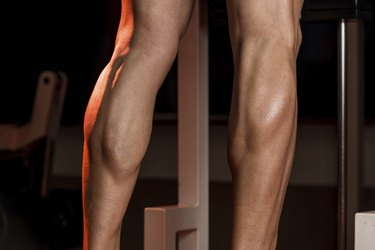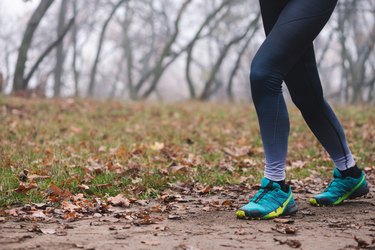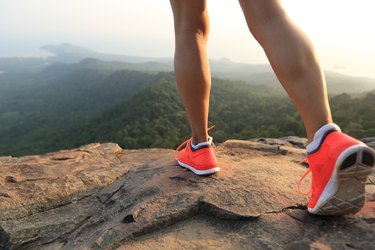
Calf raises directly target the muscles of your lower legs. You can perform this exercise with or without weights. Some people develop sore feet during and after calf raises. If you do, stop doing calf raises until you treat the pain.
There are a few different reasons your feet might hurt when doing calf raises. It's a good idea to talk to your doctor about your symptoms if the pain doesn't go away with some form adjustments or rest.
Video of the Day
Video of the Day
What Are Calf Raises?
Calf raises are done sitting or standing by rising onto the balls of your feet. This forces your lower legs to engage, strengthening the muscles of your calves.
You can also do seated calf raises on a machine in the gym or do standing calf raises holding a dumbbell in each hand to increase the resistance. And if you position your toes on an elevated surface, you'll get a greater range of motion for the exercise.
How to Do Calf Raises
- Stand near a wall with your hands on the wall for support and balance.
- Rise up on the balls of your feet as high as you can go and squeeze your calf muscles at the top of the movement.
- Slowly and with control, lower back down to the ground. Don't allow your heels to touch the ground.
- Repeat for 3 sets of 10 to 12 repetitions.
Why You Might Feel Calf Raises in Your Feet
Improper form is one of the most common reasons you feel pain in areas an exercise isn't intended to work. Make sure to do your calf raises with good form, per the instructions above, and avoid common calf raise mistakes.
If you've perfected your form, you could have weakness in your feet or a foot condition causing your pain.
- Muscle weakness: If the muscles and tendons of your feet are not used to exertion, they might strengthen along with the muscles of your lower leg. In this case, the soreness should feel like the burning sensation from a tough workout during the calf raises and a minor discomfort afterward.
- Plantar fasciitis: This form of inflammation on the bottom of your feet could cause heel pain and soreness, according to the Cleveland Clinic, including during calf raises. Talk to a doctor or physical therapist about your symptoms. Certain calf stretches may help alleviate plantar fasciitis.
- Hallux rigidus: If you have big toe pain from calf raises, you could have this arthritic condition that causes stiffness at the base of your big toe, according to the American Academy of Orthopaedic Surgeons. You'll typically feel this pain at the top of the joint during activity. If you have flat feet or bunions, you may be more likely to develop a stiff big toe, per the AAOS.
What to Do About Foot Pain After Calf Raises
Unless your doctor says otherwise, it's generally a good idea to stop doing calf raises if you experience soreness or pain. Give your feet some time to rest and avoid other strenuous activities, according to Mount Sinai
If your foot pain lingers after your workout, try icing the painful area and keep your feet elevated as much as possible. Make sure to wear comfortable, supportive shoes. You can also use an over-the-counter anti-inflammatory medication for temporary pain relief.
If the pain persists more than a week or two, or if it comes on suddenly and is severe, see your doctor, per Mount Sinai.
Alternatives to Calf Raises
If calf raises hurt your feet, you can try other exercises that challenge your lower legs, like these calf raise alternatives including single-leg jumps and sled marches.
Lower-body exercises like squats and lunges will also recruit your calf muscles, as will full-body workouts like running and walking.
More Calf Exercises to Try
Was this article helpful?
150 Characters Max
0/150
Thank you for sharing!
Thank you for your feedback!
Is this an emergency? If you are experiencing serious medical symptoms, please see the National Library of Medicine’s list of signs you need emergency medical attention or call 911.


